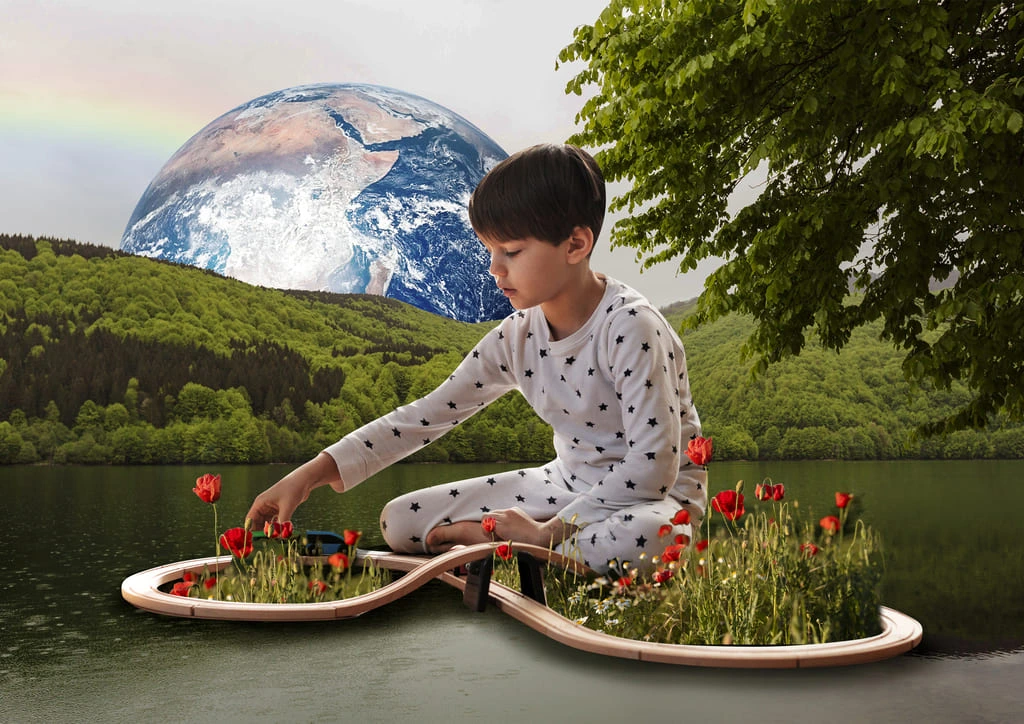What Is Nature Deficit Disorder?
Nature deficit disorder, a term popularised by author Richard Louv, refers to the detrimental consequences of a modern lifestyle characterised by reduced exposure to the natural world. It highlights the growing disconnection between humans and nature, with significant human costs. The absence of regular interactions with green spaces and the outdoors has been linked to various physical health problems, including obesity, reduced fitness levels, and an increased risk of chronic conditions. The emotional and psychological implications of nature deficit disorder are equally concerning, such as heightened stress, anxiety, and attention difficulties, particularly among children and adolescents.

The new nature movement has gained momentum by recognising the alarming trends associated with nature deficit disorder. This movement aims to counteract the negative impacts of reduced outdoor engagement by promoting the importance of reconnecting with nature. Its proponents advocate for increased access to green spaces, outdoor activities, and nature-based education to improve physical and emotional well-being. By fostering a stronger connection between humans and the natural world, the new nature movement seeks to mitigate the emotional and physical illnesses associated with nature deficit disorder.
Nature deficit disorder represents a concerning subject in today’s society, and the value of green spaces and outdoor experiences as essential components of a healthy and balanced lifestyle are necessary to combat the pervasive nature deficit in our lives.
Relevance in Today's Society
Nature deficit disorder’s relevance in today’s society cannot be overstated. In an era dominated by technology, urbanisation, and the demands of the digital age, people, especially children, spend less time outdoors and more time indoors engaged with screens. This lifestyle shift has amplified the prevalence of nature deficit disorder, leading to many physical and emotional illnesses. As our world becomes increasingly more urbanised and digitised, addressing this disorder is crucial not only for the well-being of individuals but also for the health of our planet. A deeper connection to nature can inspire environmental stewardship, encouraging individuals to appreciate and protect the natural world.
Furthermore, the COVID-19 pandemic has highlighted the importance of green spaces and outdoor activities for mental health and well-being. Lockdowns and social distancing measures underscored how valuable nature is as a respite from the challenges of isolation and stress. Many people rediscovered the therapeutic benefits of nature during this time, emphasising the need to prioritise access to green spaces in our communities. In this context, nature deficit disorder has gained renewed attention as a public health concern that warrants action. It serves as a poignant reminder that reconnecting with nature is necessary for maintaining physical and emotional balance in our increasingly urbanised and modern technology world.
The Role of Outdoor Exploration in Mental Well-being
Outdoor exploration plays a vital role in promoting mental well-being, particularly in the context of addressing nature deficit disorder symptoms. The phrase nature deficit disorder describes the damaging effects of limited exposure to natural settings. Nature deficit disorder is not a medical diagnosis but a recognised concern in the field of mental health. Scientific evidence suggests that individuals who spend more time in green spaces and engage in outdoor activities tend to experience lower levels of stress, anxiety, and depression. This connection between mental health challenges and nature underscores the importance of incorporating nature education and outdoor play into human development, especially for future generations.

One way to combat nature deficit disorder and promote mental well-being is by creating and maintaining urban parks and green spaces. These areas serve as accessible sanctuaries where individuals of all ages can connect with nature and reap the associated mental health benefits. Additionally, fostering a sense of wonder and appreciation for the natural world from a young age can help connect children to the environment, instilling lifelong habits of outdoor exploration that support their mental and emotional development.
The role of outdoor exploration in mental well-being is undeniable. We can work towards a happier and healthier population by addressing nature deficit disorder symptoms and ensuring that individuals have access to green spaces and nature education. Encouraging outdoor play and appreciation of natural settings benefits the individual and contributes to future generations’ well-being.
The Importance of Reconnecting with Nature
As human beings, our innate connection with the natural world, often referred to as the “nature principle,” is essential for our well-being. Research has shown that spending time in green spaces and engaging in nature experiences can have a profound impact on our lives. It helps reduce stress, improves mental health, and fosters a sense of peace and balance many of us yearn for in our busy lives.
Moreover, in an era where attention deficit hyperactivity disorder (ADHD) rates are rising, nature offers a valuable remedy. Environmental education programs and regular exposure to nature can significantly reduce the symptoms of ADHD, providing a holistic and medication-free approach to managing this challenge. However, parental fear and the increasing emphasis on indoor activities have limited children’s access to these enriching experiences. To ensure a healthier and more balanced future, it is crucial to reconnect children with nature, allowing them to develop a deeper appreciation for the world around them.
In essence, nature is not just an escape but an integral part of our lives. Reconnecting with nature isn’t just about preserving the environment; it’s about safeguarding our own well-being and the well-being of future generations. By prioritising green spaces and nature experiences, we can strike a harmonious balance between our modern lives and the natural world, ultimately leading to happier, healthier lives.
Nature's Therapeutic Benefits
Nature offers an abundance of therapeutic benefits, especially when it comes to mental health. Spending time outdoors provides individuals, particularly young people, with a direct experience of the natural world, which can have profound positive effects on their well-being. Being in nature or simply enjoying the outdoors can significantly improve mental disorders and increase problem-solving skills. The calming influence of natural settings helps reduce stress and anxiety, allowing individuals to focus more effectively. Furthermore, direct exposure to sunlight during outdoor activities supports the immune system, bolstering one’s physical health while enhancing mental resilience. These benefits extend beyond the individual, as whole communities can experience improved mental health and a greater sense of connection when prioritising time spent in nature.
Spending time in nature or outdoors can positively affect mental health. Here are a few of the benefits:
- Stress reduction
- Improved mood
- Enhanced creativity
- Increased focus and attention
- Mindfulness and grounding
- Physical activity
- Reduced symptoms of depression and anxiety
- Improved sleep
- Increased resilience
These benefits highlight the significant positive impact of time in nature or outdoors on mental health and well-being.
Cognitive Benefits of Outdoor Activities
Spending time in nature is linked to improved mental clarity and reduced stress levels. When individuals step away from the rush of daily life and immerse themselves in natural environments, their minds can relax and reset. This break from constant mental stimulation allows for enhanced focus and concentration when they return to their regular tasks. Additionally, outdoor activities often involve problem-solving and decision-making, whether navigating a hiking trail or strategising during a team sport. These challenges stimulate cognitive skills, such as critical thinking and spatial awareness, helping individuals sharpen their mental faculties and adaptability.
Moreover, outdoor activities encourage creativity and a sense of wonder. The natural world provides a strong source of inspiration, sparking imagination and curiosity. Exploring new landscapes, observing wildlife, or simply gazing at the stars can foster a deep appreciation for the beauty and complexity of the world, igniting a sense of wonder. This emotional connection to nature boosts mood and stimulates creative thinking. Exposure to natural environments can enhance problem-solving abilities and encourage innovative thinking, making outdoor activities valuable for nurturing cognitive flexibility and imaginative capacities.
Social Interaction and Connection with Nature
Social interaction and connection with nature are linked, influencing and enhancing the other. Humans have an innate need for social bonds, and spending time in nature provides a unique backdrop for fostering these connections. Whether through group hikes, picnics in the park, or simply gathering around a campfire, nature offers a space for people to come together, share experiences, and build meaningful relationships. These shared outdoor activities strengthen social bonds and create lasting memories, deepening the sense of belonging and community.

Furthermore, the connection with nature can profoundly affect individual and collective well-being. This positive impact on mental health can facilitate more meaningful and fulfilling social interactions. Whether it’s a walk in the woods or a day at the beach, nature’s calming and rejuvenating effects can help people feel more relaxed, open, and receptive to social connections, ultimately fostering a healthier and more interconnected society.
Children and Nature Deficit Disorder
Children and nature deficit disorder is a term coined by author Richard Louv in his book “Last Child in the Woods.” It refers to the growing disconnect between children and the natural world, driven by increasing screen time, structured indoor activities, and urbanisation. It highlights the harmful effects of this disconnection on children’s physical and mental well-being. Addressing the disorder involves promoting outdoor experiences, environmental education, and creating green spaces in urban environments to ensure that children can develop a meaningful connection with the natural world.
Parents, educators, and communities must prioritise outdoor experiences and nature-based learning to combat nature deficit disorder. Encouraging children to explore the outdoors, whether hiking, camping, gardening, or playing in the park, can help counter the negative effects of excessive screen time and indoor sedentary activities. Schools and educational institutions can incorporate nature-based curricula and outdoor classrooms to provide students with hands-on experiences in natural settings. Ultimately, fostering a sense of wonder and appreciation for the environment in children benefits their health and development and nurtures a generation of individuals who are more likely to become stewards of the planet, working to preserve and protect our natural world for future generations.
Care and Outdoor Explorations with Leaf Complex Care
Leaf Complex Care takes a holistic and humanised approach to in-home care, offering flexibility and combating nature deficit disorder by incorporating outdoor activities and walks into our caregiving regimen. We understand that connecting with nature is essential for overall well-being, and we tailor our care plans to ensure that individuals who require support can still enjoy the therapeutic benefits of the great outdoors. Our person-centred approach goes beyond traditional caregiving, promoting physical and mental health through nature-based activities, fostering a deeper connection with the environment, and ultimately enhancing the quality of life for people in our care.
With offices in Bristol, Slough, Birmingham and Somerset, we are here to provide outstanding in-home care that includes nature-inspired activities. Discover how our flexible approach can enhance your well-being or that of your loved ones.
Contact us now for more information and to schedule a meeting.


















